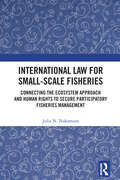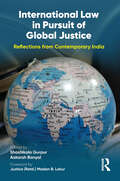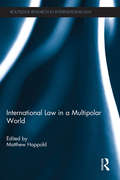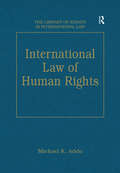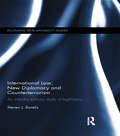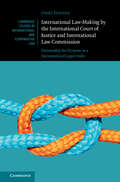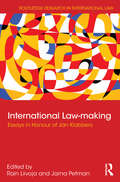- Table View
- List View
International Law as a Profession
by Wouter Werner André Nollkaemper Jean D’aspremont Tarcisio GazziniInternational law is not merely a set of rules or processes, but is a professional activity practised by a diversity of figures, including scholars, judges, counsel, teachers, legal advisers and activists. Individuals may, in different contexts, play more than one of these roles, and the interactions between them are illuminating of the nature of international law itself. This collection of innovative, multidisciplinary and self-reflective essays reveals a bilateral process whereby, on the one hand, the professionalisation of international law informs discourses about the law, and, on the other hand, discourses about the law inform the professionalisation of the discipline. Intended to promote a dialogue between practice and scholarship, this book is a must-read for all those engaged in the profession of international law.
International Law as the Law of Collectives: Toward a Law of People (The Ashgate International Law Series)
by John R. MorssThis book is concerned with how we can make sense of the confusing landscape of individualistic explanation in international law. Arguing that international law lacks the vocabulary to deal with the collective dimension and therefore perpetuates an individualistic vocabulary, the book develops and articulates a more appropriate collective approach for public international law. In doing so, it reframes longstanding problems such as the conflict between self-determination and the integrity of states and the effects and the limits of state sovereignty in an increasingly globalized world. Presenting fresh perspectives on a range of contemporary issues in international law, the book draws on the work of major contributors to legal and political theory.
International Law for Small-Scale Fisheries: Connecting the Ecosystem Approach and Human Rights to Secure Participatory Fisheries Management
by Julia N. NakamuraThis book provides an original and groundbreaking account of the applicability and key contributions of international law to small-scale fisheries, a fisheries subsector that has been historically overlooked by governments and international legal scholarship.Small-scale fisheries constitute most of the world’s capture fisheries workforce; they sustain the livelihoods of fishers and their communities while building and transmitting traditional knowledge and culture. Significant attention has been given to small-scale fisheries by the international community over the past decade, building the momentum for dedicated research on such a topic. Nevertheless, the literature examining small-scale fisheries from an international legal perspective remains scarce. This book fills this gap by systemically examining different international legal regimes to unravel the normative foundations for securing the meaningful participation of small-scale fisheries peoples in international fisheries management. It connects the ecosystem approach, a key principle of international fisheries law, and the human rights regime to elucidate the benefits that participatory international fisheries management brings to enhance both the ecological and social aspects of fisheries sustainability. It also examines the extent to which fisheries governance is democratic, and provides an enabling framework for the integration of fishers’ knowledge into international fisheries management. It is thereby oriented toward more justice and fair outcomes for small-scale fisheries.This book will be a valuable resource for academics and researchers with an interest in the governance of fisheries in international law, the law of the sea, environmental law, and human rights law, as well as to practitioners and policymakers working on the development and implementation of laws and policies governing fisheries and natural resources.
International Law in Disaster Scenarios: Applicable Rules and Principles
by Flavia Zorzi GiustinianiThe book identifies the main international concepts and rules that are of special relevance in disaster settings and critically analyses how they are implemented in such contexts. It shows that, although the crucial and growing importance of disaster response has resulted in a complex framework of international obligations, it is nonetheless guided by certain general principles/values. In particular, through an in-depth analysis of sovereignty, international cooperation and solidarity, and their manifestations in disaster contexts, the book assesses the concrete scope and nature of the obligations of the state affected by the disaster, and those of the international community, respectively. Considerable attention is devoted to the applicable legal framework governing disaster response in mixed situations of disaster and armed conflict, and to the main problems and operational challenges entailed by the involvement of foreign military personnel and assets in disaster response. The book’s overall objective is to provide an authoritative overview of the development, core issues and challenges in international law with regard to disaster scenarios, and to serve as a valuable and comprehensive reference guide.
International Law in East Asia: Issues And Prospects (The\library Of Essays On Law In East Asia Ser.)
by Zou KeyuanAs the worlds political and economic landscape changes in response to the rise of Asian countries such as China, so Asian influences on the global legal order will become more pronounced. Many countries in the region, such as Japan and South Korea, influence the development of international law in various ways, either individually or collectively through multinational organisations such as ASEAN. This collection of published work by leading East Asian scholars covers Asian perspectives concerning various issues in international law, ranging from general perspectives to particular themes such as international economic law, international human rights law, international ocean law, international criminal law, international security law and international dispute settlement. For the first time it provides a comprehensive picture of how and why East Asian countries participate in international law making, as well as comply with international law in their state practices. In so doing, the editors attempt to address the question whether the rising powers in East Asia will change the existing international legal order in future.
International Law in Pursuit of Global Justice: Reflections from Contemporary India
by Shashikala Gurpur Aakarsh BanyalThis book discusses the core concepts of international law with a focus on India’s position concerning contemporary developments in the field.The project of international law—both in its origin and evolution—has been predominantly anchored in Global North realities. Over the years, however, narratives from ‘other’ parts of the world (the Global South) have emerged to confront the traditional construction of the international legal order. The Indian narrative(s) in this regard, given the state’s expanding influence within the Global South and beyond, therefore, warrants consideration. This book responds in three ways: captures India’s contributions to the development of international law in areas including human rights, humanitarian law, international trade and investment, global commons, health, and dispute settlement; evaluates the influence of international law on India and its positioning in the global world order; and presents a way forward by mapping India’s pursuit of global justice.The book will be of interest to scholars and students working in the fields of International Law, South Asian Studies, International Relations, Human Rights, and related research areas.
International Law in a Multipolar World (Routledge Research in International Law)
by Matthew HappoldSince the creation of the United Nations in 1945, international law has sought to configure itself as a universal system. Yet, despite the best efforts of international institutions, scholars and others to assert theuniversal application of international law, its relevance and applicability has been influenced, if not directed, by political power.Today, the "decline of the West" and ascent of China and India poseparticular challenges for international law and institutions. The international system appears to be moving towards multipolarity, with various sites of power competing to exert influence in the world today. With contributors from a variety of countries providing perspectives from the disciplines of international law and international relations theory, International Law in a Multipolar World addresses the implications that multipolarity poses for the international legal system. Contributors including Jean d'Aspremont, Jörg Kammerhofer, Alexander Orakhelashvili, Christian Pippan and Nigel White, explore issues such as the use of force, governance and democracy, regionalism and the relevance of the United Nations in a multipolar world, while considering the overarching theme of the relationship between power and law. International Law in a Multipolar World is of particular interest to academics and students of public international law, international relations theory and international politics.
International Law in a Transcivilizational World
by Onuma YasuakiThe twenty-first century will witness conflicts which may destabilize the international order. These conflicts are likely to arise between emerging Asian States such as China and India whose material power is growing, and the Western nations who wield significant ideational power. A West-centric international society will change to a multi-polar and multi-civilizational global society. This structural change includes, and further needs, changes of understandings and perceptions of the world, including of international law. The perspectives from which we see, understand, appreciate and assess international law must change. We need to interpret international law not only from a prevalent Statecentric international perspective and West-centric transnational perspective. Onuma argues that we must grasp international law from what he calls a trans-civilizational perspective as well. By adopting such three-layered perspectives, international law is shown to be functioning as a tool of politics yet constrained by cultural and civilizational factors. Such complex subjects as global history of international law, concepts of general and customary international law, and human rights could be appreciated in a more nuanced and subtle manner.
International Law in the Middle East: Closer to Power than Justice
by Jean AllainExamining international law through the lens of the Middle East, this insightful study demonstrates the qualitatively different manner in which international law is applied in this region of the world. Law is intended to produce a just society, but as it is ultimately a social construct that has travelled through a political process, it cannot be divorced from its relationship to power. The study demonstrates that this understanding shapes the notion, strongly held in the Middle East, that law is little more than a tool of the powerful, used for coercion and oppression. The author considers a number of formative events to demonstrate how the Middle East has become an underclass of the international system wherein law is applied and interpreted selectively, used coercively and, in noticeable situations, simply disregarded. International Law in the Middle East brings various narratives of history to the fore to create a wider arena in which international law can be considered and critiqued.
International Law in the Transition to Peace: Protecting Civilians under jus post bellum (Post-Conflict Law and Justice)
by Carina LamontThis book proposes a normative framework specifically designed for the complex and legally uncertain time period between armed conflicts and peace. As such, it contributes both to the furthering of a jus post bellum framework, and to enhanced legal clarity in complex and legally uncertain environments. This, in turn, contributes to strengthened protection engagements, and thus to improved prospects of enabling sustainable peace and security in both national and international perspectives. The book offers a novel but persuasive argument for a legal framework specific for transitional environments. Such legal framework, it is argued, is warranted in order to enable legal clarity to contemporary and outstanding legal issues, as well as to furthering peace efforts in complex environments. The legal framework suggested proposes a dividing line between applicable legal frameworks that, it is submitted, enhances both legal clarity on protection engagements and the quest for sustainable peace. The framework proposed is founded on a legal analysis of the protective nature and function of law. It thus provides a rare but important perspective on law that is of value in the quest for sustainable peace and security. The research draws uniquely on both contemporary legal debates, and on peace and conflict research. It does so in order to enable legal analysis that is both legally sound, as well as appropriate and adequate in today’s peace and security realities. The book provides a valuable resource for academics, researchers and policy-makers in the areas of Public International Law, International Humanitarian Law, International Human Rights Law, (the law of) Peace Operations, and Peace and Security Studies.
International Law in the U.S. Supreme Court
by Michael D. Ramsey William S. Dodge David L. SlossFrom its earliest decisions in the 1790s, the U.S. Supreme Court has used international law to help resolve major legal controversies. This book presents a comprehensive account of the Supreme Court's use of international law from the Court's inception to the present day. Addressing treaties, the direct application of customary international law and the use of international law as an interpretive tool, the book examines all the cases or lines of cases in which international law has played a material role, showing how the Court's treatment of international law both changed and remained consistent over the period. Although there was substantial continuity in the Supreme Court's international law doctrine through the end of the nineteenth century, the past century was a time of tremendous doctrinal change. Few aspects of the Court's international law doctrine remain the same in the twenty-first century as they were two hundred years ago.
International Law of Victims
by Carlos Fernández de Casadevante RomaniAfter having ignored victims, only recently both domestic and international law have begun to pay attention to them. As a consequence, different international norms related to victims have progressively been introduced. These are norms generally characterized by a certain concept from the perspective of victims, as well as by the enumeration of a list of rights to which they are entitle to; rights upon which the international statute of victims is built. In reverse, these catalogues of rights are the states' obligations. Most of these rights are already existent in the international law of human rights. Consequently, they are not new but consolidated rights. Others are strictly linked to victims, concerning the following categories: victims of crime, victims of abuse of power, victims of gross violations of international human rights law, victims of serious violations of international humanitarian law, victims of enforced disappearance, victims of violations of international criminal law and victims of terrorism.
International Law of Human Rights: The Compatibility Approach In The Practice Of International Human Rights Institutions (The\library Of Essays In International Law Ser.)
by K. Addo MichaelInternational law is a social construct crafted by human endeavour to achieve or at least contribute to the achievement of goals perceived to be valuable or necessary to effective social relations. In effect, international law is no more than a facilitative process and so cannot have answers and conclusions of its own other than what lies within the ambitions of those who define the limits of the process. The essays collected together here reveal how international law facilitates the achievement of the long standing ambition of turning human rights ideals and rhetoric into reality.
International Law of Underwater Cultural Heritage: Understanding the Challenges
by Kim Browne Murray RaffThis book brings together three distinct areas of International Law – namely Environmental, Heritage and Ocean Law – to address the international legal protection of historically significant wrecks, with particular focus on the environmental hazards they may pose. The confluence of Heritage Law and the Law of the Sea with International Environmental Law represents an important development in international governance strategies for the twenty-first century, in particular those legal and administrative regimes that concern the world’s oceans and underwater cultural heritage protection. Importantly, connections between international legal regimes, such as the 1982 Law of the Sea, and institutions like the International Maritime Organisation (IMO) and United Nations Education Scientific Cultural Organisation (UNESCO), can play a crucial part in governance strategies that involve the regulation of marine pollution and historic shipwrecks.
International Law's Collected Stories (Palgrave Studies in International Relations)
by Sofia Stolk Renske VosThis edited volume presents a collection of stories that experiment with different ways of looking at international law. By using different literary lenses -namely, storytelling, the novel, the drama, the collage, the self-portrait, and the museum- the authors shed light on elements of international law that usually remain unseen or unheard and expose the limits of what international law can do. We inquire into who the storytellers of international law are, the stages on which they tell their stories, and who are absent in these tales. We present it as a collection: a set of different essays that more or less deal with the same subject matter. Alternatively, we would like to call it a potpourri of stories, since the diversity of topics and approaches is eclectic and unconventional. By placing multiple perspectives alongside each other we aim to compare and contrast, to allow for second thoughts, and to rediscover. In doing so, we engage with the ambiguities of international law’s characters and spaces, and with the worldviews they reflect and worlds they create.
International Law, Climate Change and Bangladesh
by Mahatab UddinThis book explores the possibilities and scope of facilitating Bangladesh’s battle against climate change with regard to relevant international legal instruments, as well as national laws and policies. The Post-Paris global climate regime considers adaptation, mitigation, climate finance, technology transfer, capacity building, and compensation for losses and damage associated with climate change as essential tools for combating it. This book includes chapters on each of the above topics. Additionally, it covers integrating digital technologies in climate-smart agricultural practices, government land acquisition practices and their repercussions on changing land conditions, the legal landscape overseeing climate change and foreign direct investment, and the regulatory interplay between domestic trade and climate policies in Bangladesh. The book comprehensively covers climate justice issues by addressing climate-induced migration, access to clean water, gender-responsive climate action, public interest environmental litigation, and, above all, the climate-change-development nexus in Bangladesh. This book is intended for researchers, policymakers, university students, and practitioners in international environmental law and climate change law.
International Law, Human Rights and Public Opinion: The Role of the State in Educating on Human Rights Standards
by Heping DangThis book explores situations in which public opinion presents itself as an obstacle to the protection and promotion of human rights. Taking an international law perspective, it primarily deals with two questions: first, whether international law requires States to take an independent stance on human rights issues; second, whether international law encourages States to inform and mobilise public opinion with regard to core human rights standards. The discussion is mainly organised within the framework of the UN system. The work is particularly relevant to situations in which public opinion appears as discriminatory attitudes based on race, gender, age, health, sexual orientation and other factors. It is also pertinent to circumstances in which public opinion is responsible for the existence of certain harmful customs and practices such as female genital mutilation and capital punishment. Noting that the death penalty is increasingly recognised as an infringement of human rights, this study further challenges States’ argument that capital punishment cannot be abolished because of public opinion. The book also discusses the role that education bears under international law in moulding favourable attitudes towards human rights. Finally, the book challenges States’ acceptance that public opinion cannot be confronted in this respect.
International Law, Necropolitics, and Arab Lives: The Legalization of Creative Chaos in Arabia
by Khaled Al-KassimiInternational Relations and International Law continue to be accented by epistemic violence by naturalizing a separation between law and morality. What does such positivist juridical ethos make possible when considering that both disciplines reify a secular (immanent) ontology? International Law, Necropolitics, and Arab Lives emphasizes that positivist jurisprudence (re)conquered Arabia by subjugating Arab life to the power of death using extrajudicial techniques of violence seeking the implementation of a "New Middle East" that is no longer "resistant to Latin-European modernity", but amenable to such exclusionary telos. The monograph goes beyond the limited remonstration asserting that the problématique with both disciplines is that they are primarily "Eurocentric". Rather, the epistemic inquiry uncovers that legalizing necropower is necessary for the temporal coherence of secular-modernity since a humanitarian logic masks sovereignty inherently being necropolitical by categorizing Arab-Islamic epistemology as an internal-external enemy from which national(ist) citizenship must be defended. This creates a sense of danger around which to unite "modern" epistemology whilst reinforcing the purity of a particular ontology at the expense of banning and de-humanizing a supposed impure Arab refugee. This book will be of interest to graduate students, scholars, and finally, practitioners of international relations, political theory, philosophical theology, and legal-theory.
International Law, New Diplomacy and Counterterrorism: An interdisciplinary study of legitimacy (Routledge New Diplomacy Studies)
by Steven J. BarelaThis interdisciplinary book explores how terrorism is meant to target a government’s legitimacy, and advocates for sounder defensive measures when countering international attacks. The dramatic increase in global cooperation throughout the twentieth century—between international organisations and their state missions of diplomats, foreign officers, international civil servants, intelligence officers, military personnel, police investigators, judges, legislators, and financial regulators—has had a bearing on the shape and content of the domestic political order. The rules that govern all of these interactions, and the diplomats engaged to monitor and advocate for compliance, have undergone a mushrooming development following the conclusion of each world war. This dramatic growth is arguably the most significant change the international structure has experienced since the inception of the state-based system ushered in with the Peace of Westphalia in 1648. International Law, New Diplomacy and Counterterrorism explores the impact of this growth on domestic legitimacy through the integration of two disciplines: international law and political philosophy. Focusing particularly on the cross-border counterterrorism actions launched by the United States, the author investigates how civil societies have often turned to the standards of international law to understand and judge the legitimacy of their government’s counterterrorism policies reaching across international borders. The book concludes that those who craft counterterrorism policies must be attentive to defending the target of legitimacy by being wholly mindful of the realms of legality, morality and efficacy when exercising force. This book will be of much interest to students of international law, diplomacy, counterterrorism, political philosophy, security studies and IR.
International Law, Politics and Inhumane Weapons: The Effectiveness of Global Landmine Regimes (Law, Conflict and International Relations)
by Alan BrydenThis book contributes to contemporary debates on the effectiveness of international humanitarian law (IHL) in regulating or prohibiting inhumane weapons, such as landmines. Two treaties have emerged under IHL in response to the humanitarian scourge of landmines. However, despite a considerable body of related literature, clear understandings have not been established on the effectiveness of these international legal frameworks in meeting the challenges that prompted their creation. This book seeks to address this lacuna. An analytical framework grounded in regime theory helps move beyond the limitations in the current literature through a structured focus on principles, norms, rules, procedures, actors and issue areas. On the one hand, this clarifies how political considerations determine opportunities and constraints in designing and implementing IHL regimes. On the other, it enables us to explore how and why ‘ideal’ policy prescriptions are threatened when faced with complex challenges in post-conflict contexts. This book will be of much interest to students of international humanitarian law, global governance, human security and IR in general.
International Law, Us Power
by Shirley V. ScottObservers of the USA's attitude towards international law seem to be perpetually taken aback by its actions, whether those relate to the use of force, the International Criminal Court or human rights. This book sets out to articulate the considerable degree of continuity in the nature of US engagement with international law. International Law, US Power explains that the USA has throughout its history pursued a quest for defensive and offensive legal security and that this was a key ingredient in the rise of the USA. Although skilful strategic involvement with international law was an ingredient in the USA 'winning' the Cold War, the rise of China and the growing negotiating strength of leading developing countries mean that the USA is likely to find it increasingly difficult to use the same set of techniques in the future.
International Law-Making by the International Court of Justice and International Law Commission: Partnership for Purpose in a Decentralized Legal Order (Cambridge Studies in International and Comparative Law)
by Omri SenderThe book provides an unparalleled account of the links that draw together the International Court of Justice and the International Law Commission, exposing the depth of the relationship between these central organs of the international legal system and its profound, unintended impact. By drawing upon historical records, as well as interviews with members of both organs, the book reveals that the original vision for interaction between the Court and the Commission has been lost in time. It inquires not only into the cross-fertilization that may be traced in the output of each body but also into the more subtle ties that they nurture; it also shows how even the rare occasions of disagreement attest to the strength of the inter-institutional relationship rather than undermine it. All this throws light on the largely intangible process of international law-making and challenges the notion that international legislation is the sole preserve of States.
International Law-making: Essays in Honour of Jan Klabbers (Routledge Research in International Law)
by Rain Liivoja Jarna PetmanThis book explores law-making in international affairs and is compiled to celebrate the 50th birthday of Professor Jan Klabbers, a leading international law and international relations scholar who has made significant contributions to the understanding of the sources of international legal obligations and the idea of constitutionalism in international law. Inspired by Professor Klabbers’ wide-ranging interests in international law and his interdisciplinary approach, the book examines law-making through a variety of perspectives and seeks to breaks new ground in exploring what it means to think and write about law and its creation. While examining the substance of international law, these contributors raise more general concerns, such as the relationship between law-making and the application of law, the role and conflict between various institutions, and the characteristics of the formal sources of international law. The book will be of great interest to students and academics of legal theory, international relations, and international law.
International Law: Cases and Materials (6th Edition)
by Lori F. Damrosch Sean D. MurphyThis classic international law casebook has been updated to cover recent case law, including the International Court s Extradite or Prosecute (Belgium v. Senegal) case, and the Supreme Court s decisions in Samantar v. Yousef (on foreign sovereign immunity) and Kiobel v. Royal Dutch Petroleum (on the Alien Tort Statute). With extraordinary range and depth, this casebook probes "hot topics" such as the Syrian civil war, the seizure of pirates, and the ICC's indictments of African leaders, all calculated to provoke engaging classroom discussions. This casebook is designed for introductory and advanced classes, with detailed readings on the structure and actors of international law and on specialized areas.


